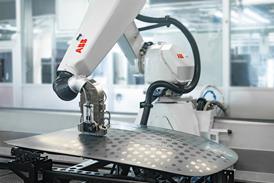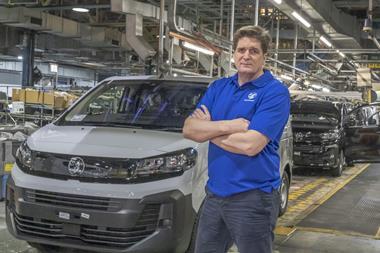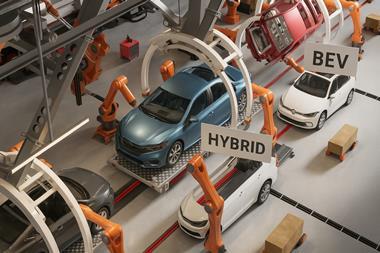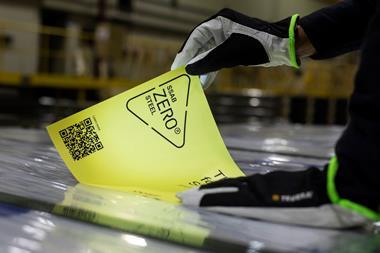
With the energy savings it brings, the skidless paintshop is proving to be a popular idea
 There are some real heavyweights on the move inside automotive manufacturers’ production facilities: 200kg skids transfer 300kg vehicle bodies from the bodyshop to pretreatment, and on through the entire paintshop. Over 1,200 conveyor components and more than 1,600 drives are required to transport the vehicle bodies, with an average throughput of 60 units per hour. The standard solutions used by many factories are expensive to run and maintain, and are particularly costly in terms of power consumption.
There are some real heavyweights on the move inside automotive manufacturers’ production facilities: 200kg skids transfer 300kg vehicle bodies from the bodyshop to pretreatment, and on through the entire paintshop. Over 1,200 conveyor components and more than 1,600 drives are required to transport the vehicle bodies, with an average throughput of 60 units per hour. The standard solutions used by many factories are expensive to run and maintain, and are particularly costly in terms of power consumption.
However, as energy prices and global emissions continue to rise, automotive OEMs are under real pressure to significantly increase energy efficiency in manufacturing. Moreover, as carmakers expand their range of models, and the trends of material combinations and made-to-measure products gather pace, there is a growing clamour for more flexible systems.

Flexibility to meet future challenges“Flexibility will be increasingly important if we are to equip our customers’ production facilities to meet future challenges. As plant engineering specialists, our task is to deliver the ideas and solutions they need,” stresses Jörg Robbin, vice-president of product development at Eisenmann, the German-based global industrial solutions provider for surface finishing. Robbin adds: “The wheel is one of mankind’s most important achievements, so we don’t have to reinvent it to find the solutions of the future. What we need most of all are good ideas – and the ability to put these ideas together to create coherent component combinations.”
On track for a skidless futureOne solution has been clear to Robbin for quite some time – the heavy skids need to go. He and his team at Eisenmann Business Unit Automotive Systems decided to evolve the existing skid conveyor systems, with a view to cutting energy consumption by up to 13% in the drying phase alone. “We want to offer our customers flexible solutions that will enable their manufacturing facilities to overcome future challenges, while lowering energy costs,” he explains. “We have pursued this line of thinking and ultimately arrived at our vision for a skidless paintshop – an idea that has been well received by our customers.”
The VarioLoc modular conveyor system forms the basis of the skidless paintshop. This solution is simply mounted on rails, with no call for sophisticated peripheral equipment. VarioLoc is capable of navigating corners and inclines, and each shuttle is equipped with its own controller – enabling it to be individually operated, and removed for repair and maintenance as needed. Moreover, VarioLoc helps minimise operating costs by eliminating the need to run multiple systems. It is able to convey a wide range of vehicle bodies. And because it is a standardised solution, VarioLoc is easy and inexpensive to maintain, and reduces the number of replacement parts that users need to keep in inventory.
Power-independent, smart-manufacturing readyIn the future, this skidless design will help processes to be streamlined even further, thanks to real-time information. Because VarioLoc is individually controllable, it is highly flexible, allowing it to convey all types of vehicle body through the dryer. As a result, it will enable the design and development of new, pioneering dryer solutions. VarioLoc passes under the dryer itself – removing the need for additional conveying equipment. No mechanical abrasion occurs, and lubricants are no longer required.
Material combinations are becoming increasingly common, and these materials have diverse physical properties. Against this background, VarioLoc allows manufacturers to run customised programs tailored to the specific requirements of each vehicle body. Users are able to monitor temperature profiles during the drying process and make adjustments if required. Moreover, cycle times can be precisely adjusted to make the best possible use of available capacity.
Robbin has been inspired by current trends such as e-mobility, and his vision is clear: “We want to be the first to create a system that conveys vehicle bodies through the paintshop without requiring an external power source. We believe VarioLoc is the perfect solution to get the smart manufacturing trend up and running.”
 Eisenmann is to construct a turnkey paintshop for Volvo at its new factory in Berkeley County, South Carolina. This will be the Swedish carmaker’s first plant in the US, with a proposed annual capacity of 100,000 units.
Eisenmann is to construct a turnkey paintshop for Volvo at its new factory in Berkeley County, South Carolina. This will be the Swedish carmaker’s first plant in the US, with a proposed annual capacity of 100,000 units.
The contract is one of the largest in Eisenmann’s history. CEO Matthias von Krauland says: “We are particularly pleased that Volvo has entrusted Eisenmann not only with supplying the equipment, but also with overseeing the entire construction project of the paintshop.
This business underscores our ability to take full responsibility for projects of this scale and to master the huge complexities involved.” Volvo Cars also opted to deploy Eisenmann’s innovative E-Shuttle and E-Cube products.
The compact E-Shuttle 200, a unique combination of shuttle conveyor and pendulum conveyor, ensures outstanding coating quality at high throughputs. The two-axis system will transport 30 bodies per hour through pretreatment and electrocoating.
In addition, E-Shuttle’s low height requirements compared with rival systems translates into lower building costs. E-Cube paint overspray removal systems will be installed in the primer and topcoat spray booths.
E-Cube, which operates without water, chemicals or additives and helps to fulfil the Swedish company’s ambitious criteria regarding manufacturing efficiency. The scope of supply includes the building and related infrastructure, all conveyor equipment, control systems, visualisation tools and a high-bay warehouse for buffering during production.







































